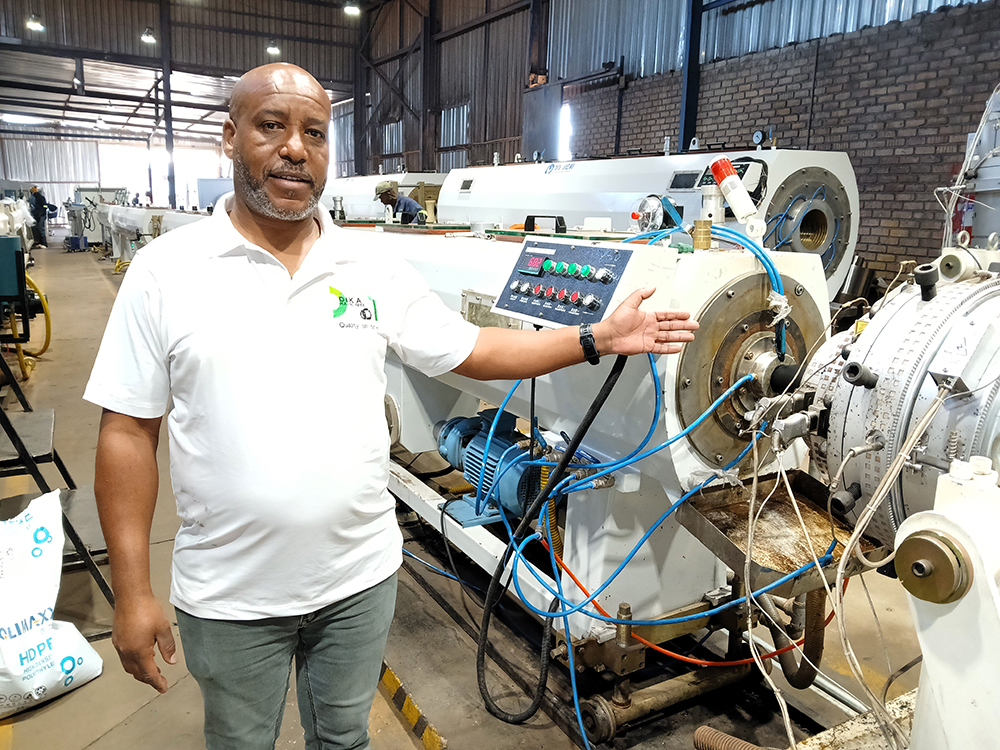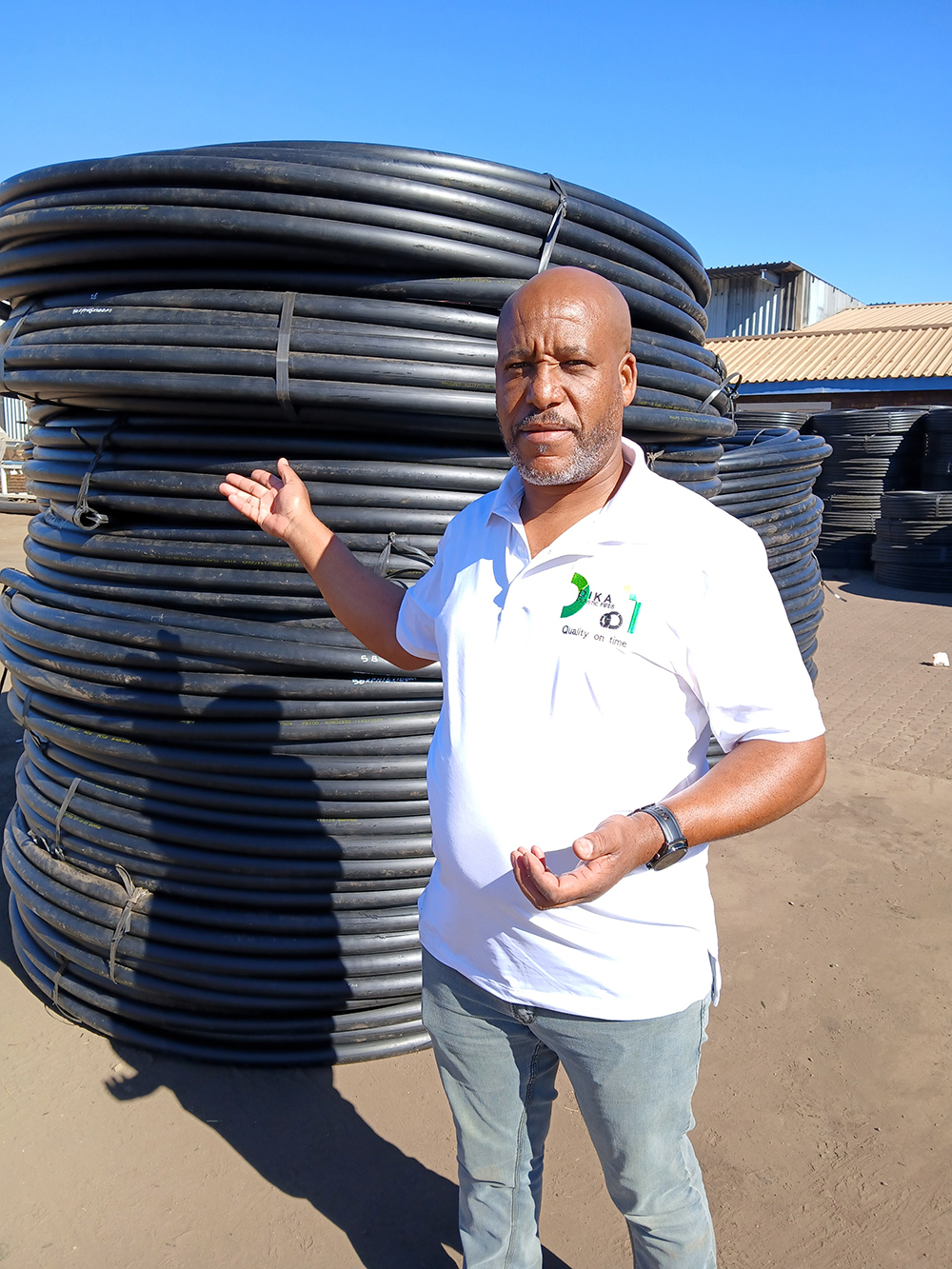With the government support, South African companies will be able to contribute significantly in creating jobs in order to reduce unemployment. This is the view of the Managing Director of Dika Plastic Pipes, Mr Dikotsi Moloi.
His company is based in Middleburg, Mpumalanga, where they manufacture plastic pipes used in agriculture, mining, construction and civil industries. The company supplies clients in various parts of the country. They also export their products to eSwatini through one of their clients.
Dika Plastic Pipes received financial support from the Department of Trade, Industry and Competition (the dtic) and its agency, the National Empowerment Fund, as part of the Black Industrialists Programme. The programme is part of government’s efforts to promote industrialisation, sustainable economic growth, job creation and transformation through the support of black-owned companies mainly in the manufacturing sector. More than one thousand companies have been supported since the programme was launched in 2016.
“The support that we received from the dtic and the NEF helped us to expand our business by increasing production and creating a significant number of jobs. I am the kind of a businessman who derives pleasure and inspiration more from creating employment than making profit, because of my humble socio-economic background,” says Moloi (44).
“Seeing the company growing from two employees that I started with, to the 32 people that we are currently employing as a result of the support that we obtained from the dtic and NEF, is a great achievement that makes me sleep well at night, considering the number of people that benefit from our employees. Each one of our employees is likely supporting three to five family members, making a huge difference in their lives,” he adds.
Moloi used the funding from the dtic and the NEF to purchase machinery, equipment and vehicles to deliver his products. The support enabled him to increase his production from 50 tons to 130 tons of plastic pipes per month that his company currently produces.
Moloi, who was born in the rural area of Phuthaditjhaba, QwaQwa, Free State worked as a gardener in Durban for three years after matriculating from Reahola Secondary School. He then found a job as a storeman at a Durban-based plastic pipe manufacturing company, Pace Plastics, and his life was changed for good as he decided that plastic manufacturing would be his career industry. His ability to learn quickly enabled him to rise through the ranks until he was appointed the general manager of the company.
Moloi then moved to another Durban company, Sangio Pipes, as a factory manager where he worked for four years. When the company relocated to Johannesburg he was forced to remain in Durban as his family had already settled there. He then joined the Durban-based Inkulu Plastic Pipes as a quality manager working in the product technical department and product testing laboratory, something which enabled him to complete his knowledge of the entire plastic pipe manufacturing chain.
In 2021 he decided to establish his own business because he was confident that he understood the entire plastic pipe manufacturing industry and was ready to challenge himself.
“I started by buying a second had machine that was not in a working condition. It took me more than a year to rebuild it. During that time, I was buying and selling the pipes to keep the business running. In 2023 I set up factory in Middleburg and obtained the South African Technical Auditing Services certificate, which certified our products under the national standards allowing us to start manufacturing the pipes,” recalls Moloi
After obtaining the prerequisite certificate that allowed him to manufacture, Moloi applied for funding from the dtic and NEF as part of the department’s Black Industrialists Programme.
“One of the three manufacturing machines that we bought through the funding still have to be commissioned. Once it gets into the production line we will be able to grow our production even more and create additional employment. We are already operating 24 hours on a three-shift system. We regard ourselves as an example of what companies that can do to contribute to job creation with the support of government. We are grateful to both the dtic and NEF,” concludes Moloi.

The Managing Director of Dika Plastic Pipes, Mr Dikotsi Moloi next to the manufacturing machines that he acquired through the support of the Department of Trade, Industry and Competition (the dtic), and the National Empowerment Fund as part of the Black Industrialists Programme.

The Managing Director of Dika Plastic Pipes, Mr Dikotsi Moloi showing the plastic pipes produced at the Middleburg-based company.
MEDIA ENQUIRIES:
Bongani Lukhele – Director: Media Relations
Tel: (012) 394 1643
Mobile: 079 5083 457
WhatsApp: 074 2998 512
E-mail: BLukhele@thedtic.gov.za
Issued by: The Department of Trade, Industry and Competition (the dtic)
X: @the_dtic
Facebook: https://www.facebook.com/thedti?mibextid=ZbWKwL
YouTube: https://www.youtube.com/@thedtic
Website : https://www.thedtic.gov.za/

